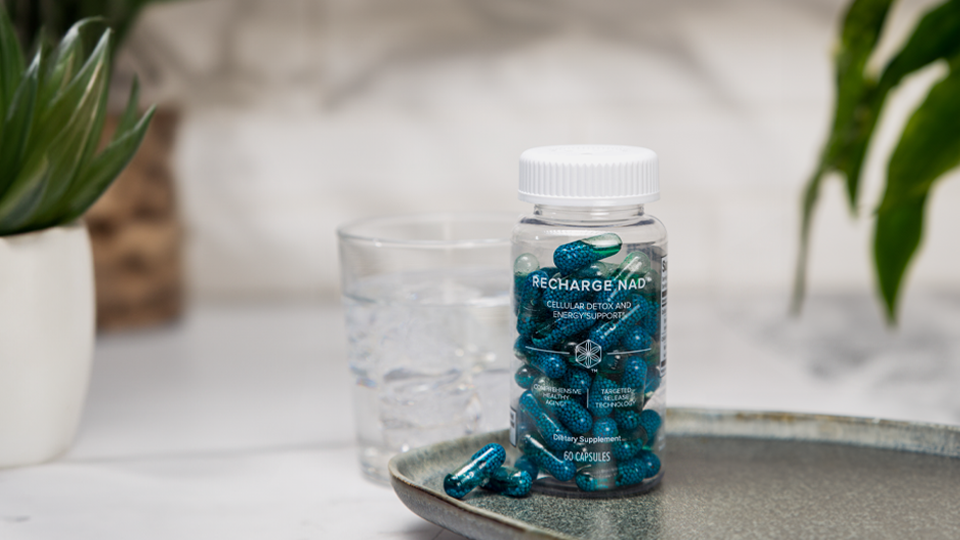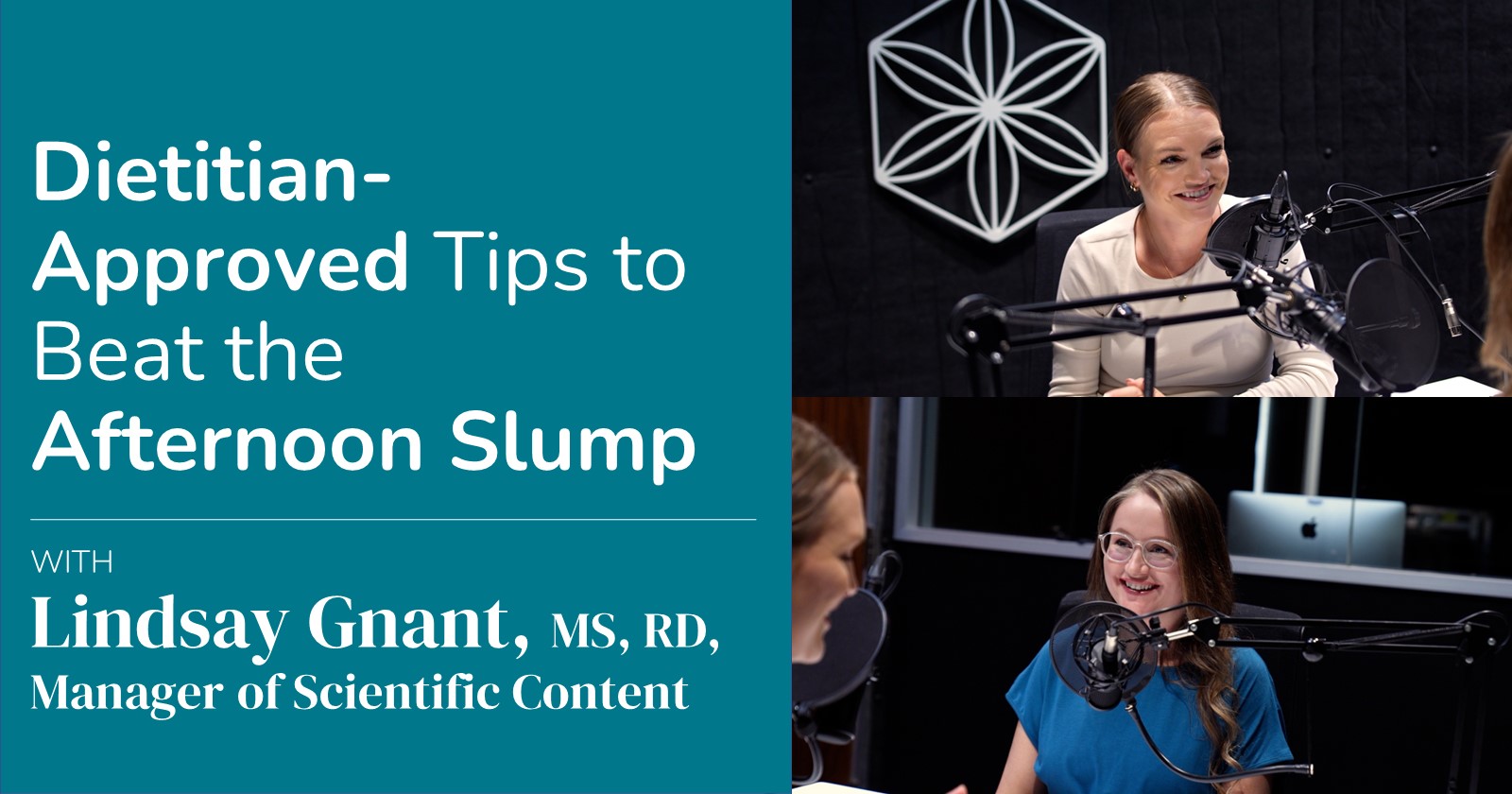Whether you are a seasoned runner or just starting out, the question of “what to eat” can be baffling. Depending on the intensity, frequency, and duration of exertion, the specific nutrition needed to properly fuel and aid in performance and recovery changes (1). The following answers will assist in helping you put sound nutrition practices into play. Remember—what you eat and drink can make or break your runs.*
1. What should I eat before training?
As your mileage and training intensity increases, so will your demand for pre-training nutrients (2). Fueling pre-run with complex carbohydrates will assist your body in efficiently manufacturing and burning energy as adenosine triphosphate (ATP). ATP is what powers your run. The ATP energy you need and use during your run is formed partly through the breakdown of glucose (1, 2). Complex carbohydrates provide just that, glucose.
Scientists recommend pre-run fuels that include easily digested complex carbohydrates consumed one to two hours before exercise (1, 2). Complex carbohydrates are generally higher in fiber and lower in simple sugars, providing longer-burning energy. An ideal pre-run snack would combine complex carbohydrates with low fat and moderate- or high-protein foods. For example: a whey protein shake with added oats, hemp seeds, or a spoonful of peanut butter.
2. Do I need a pre-workout supplement?
If you wish to have an enjoyable and extended workout, a pre-workout supplement is ideal. Researchers have found that using caffeine prior to working out increases the perceived enjoyment of exercise and aids in finishing strong (3). In addition, sports nutrition scientists from Basel, Switzerland recommend supplementing pre-exercise nutrition with caffeine and dietary nitrates (as found in beets, spinach, and arugula) (4).
For optimal performance, athletes choosing to use caffeine should caffeinate at least one hour before exercise. Like caffeine, beetroot juice has also been scientifically studied to aid the body in endurance activities and to increase stamina (4). Based on existing evidence, endurance athletes should supplement with nitrate-rich beetroot juice in the days leading up to an event as well as an hour or two before exertion (4).
Isagenix e+™ energy shots can also be combined with any flavor of Replenish™ for an energizing and hydrating pre-workout supplement. Coffee, plain or over ice, and blended with a scoop of Natural Chocolate IsaLean® PRO, is a great tasting way to supplement pre-workout as well.
3. What should I eat after training?
Optimal post-training recovery depends on three things: replacement of glycogen, replenishment of electrolytes, and rest (1). If you want to be ready for your next workout, immediate post-training fuel is needed to minimize lactic acid and to bring the body back into homeostasis. Refuel with both protein and complex carbohydrates and replenish your electrolytes with additional foods and fluids.
Whey protein is the suggested recovery fuel for fast-absorbing nutrition that aids muscle synthesis and that provides the branched-chain amino acids (BCAAs) that muscles need after training to fuel growth (5).
The whey protein you choose should also include some quickly absorbed carbohydrates. If using IsaPro®, try blending a banana or a handful of berries into it. Dense fiber foods and fats, such as hemp seeds, flax, nuts, and avocado, can also be added to your post-run fuel for taste. IsaLean Shake or IsaLean PRO Shake blended with fresh berries, Replenish (any flavor), or Ionix® Supreme, or topped with a crumbled IsaDelight Plus™, are all excellent ways to deliver immediate nutrition to the body. Or, blend IsaLean Shake (Creamy French Vanilla or Creamy Dutch Chocolate), t+ Chai, a banana, and top with a crumbled IsaLean Bar. Adding Replenish to Creamy French Vanilla IsaLean Shake or Natural Vanilla IsaLean PRO Shake is also a delicious way to replace glycogen and electrolytes.
4. If I am only working out once a day, how important is it to refuel after training?
Regardless of the amount of workouts you endure, your body needs carbohydrates, protein, and electrolytes to be replenished (1, 6). Sports drinks with healthy carbohydrates offer an easy solution. Consuming electrolytes should be done during the post-exercise window, immediately after exertion, and throughout the next 24 hours (1-6). Post-exercise whey protein shakes (like IsaLean PRO) with added electrolyte powders (such as Replenish) will do the trick.
5. If I am working out twice a day, how often and what should I eat to optimize energy?
If you are working out multiple times in the same day, it is essential to refuel with 50 grams of complex carbohydrates after each workout and to eat additional small snacks or meals containing complex carbohydrates every few hours in between (1, 12). Your body will need the added glucose, the added electrolytes, and additional rest. This increased nutrition should be spaced throughout the day, up until bedtime.
Keep snacks on hand. Do not skip meals. Eat moderate portions (12).
High-energy snacks include coffee-infused protein smoothies, oats with hempseeds, and energy bars. Try homemade freezer pops made with blended IsaLean PRO, Replenish, and fruit.
6. What should I eat on my day off?
When you are not pounding the pavement, reduce your carbohydrate intake and eat a balanced menu of healthy foods. You will not be firing through your glycogen stores as you do on training days. Although many believe carbohydrate loading on days off to be a sound nutritional strategy, scientists recommend moderate intakes of healthy fuels to better expedite recovery (7). Examples include quinoa, fish, vegetables and moderate servings of fruit. Rest days also present an opportunity for scheduled Isagenix Cleanse Days.
7. What should I eat during the week before a race to prepare?
Similar to rest days, trying to “carb load” by eating an increased amount of carbohydrates the night before a race or workout is not very productive—it must be a process where you prime your body progressively. Increase carbohydrates throughout the days before a race, while gradually tapering activity (7). This might include adding sweet potatoes, whole grains, and more fruit to your diet, as well as trading in high-intensity runs for slower-paced jogs or doing yoga.
The rationale for upping carbohydrate intake prior to an event is to ensure maximum glycogen stores, which helps delay race-day fatigue and aids in maintaining a greater pace over longer distances (7).
8. How important is protein for an endurance athlete?
Protein plays a pivotal role in any athlete’s success. It provides the body with the amino acids that are needed and used by every cell, tissue, organ, and system. Protein allows for cellular growth and recovery. And, although often misunderstood, protein supports muscle growth (it does not cause muscle growth). Exercise produces stress on and to the muscles, and it’s this process that initiates muscle growth. Protein is simply essential to the support of muscle development and recommended immediately after working out (2).
Protein also prevents muscle wasting, aids speedy recovery of damaged muscle and tissues, promotes mitochondrial biogenesis, supports better oxygenation, and provides the satiety hard working body’s desire (2, 8, 9).
Isagenix IsaLean PRO and IsaLean Shake are excellent protein sources that can be blended or added to many foods for better performance fuels. Adding IsaLean PRO to slow-cooked oats, yogurt, and natural puddings is a smart way to increase protein intake. Isagenix Whey Thins™ can be crushed or crumbled and added to salads, cottage cheese, or hummus for added protein and crunch.
9. How important is fat for an endurance athlete?
Fats offer the body twice the energy per gram than carbohydrates do. They are a slower-burning fuel, critical to hormone production, promote nutrient uptake, and provide a physical protective cushion for the body’s internal organs. Adequate fat intake also protects the athlete from injury and from hormonal disregulation (1).
Runners need fat and will require greater fat intakes to fuel longer sessions of lower intensity exercise. When the runner sets out on a long tempo run, fat does not become available for energy use until the glycogen stores, from carbohydrates, are burned. This adaptation occurs about 30 minutes into an exercise session. Scientists argue that fat alone can supply up to 60 percent of energy required for a long bout of exercise (1, 7).
10. What are the best sources of carbs, protein, and fat for endurance athletes?
Think low-glycemic carbohydrates, quality sources of protein, and fish-based or plantbased polyunsaturated fats (1-7). Low-glycemic carbohydrates come from oats and whole grains, and fruits and vegetables. These can also be added to whey protein shakes. Fish, such as tuna, mackerel, sardines, herring, and salmon, provide rich sources of protein and omega-3 fatty acids vital for performance and recovery (1). Avocados, nuts, hemp seeds, and flax top the list of plant-based fats easily added to shakes and salads. Sports drinks, gels, blocks, bars, and bananas are smart choices during an endurance event to restore and maintain electrolyte balance. Post-endurance fuel should include recovery shakes, made with whey protein, hemp seeds, oats, and added electrolytes. Meals and snacks should be planned, and recovery meals and drinks should not be delayed (10-12). Most importantly, ensure you are not skipping meals or forgetting to hydrate (10).
Remember, your run tomorrow depends on your nutrition today.
*Exercise intensity can depend on age, active status, and health status. It’s advised to check with your personal physician before starting any physical activity program.
References
-
Williams C. Recovery from exercise: Role of carbohydrate nutrition. J Move Health Exerc 2014;3:1-13.
- Barys A et al. Sports nutrition: Critical components for optimal performance. J Student Res. Georgia College.
- Schubert M et al. Caffeine consumption around an exercise bout: Effects on energy expenditure, energy intake, and exercise enjoyment. J Appl Physiol 2014;117:745-754.
- Ormsbee M et al. Pre-Exercise Nutrition: The role of macronutrients, modified starches and supplements on metabolism and endurance performance. Nutrients 2014;6:1782-1808.
- Phillips S et al. The role of milk-and soy-based protein in support of muscle protein synthesis and muscle protein accretion in young and elderly persons. J Am Coll Nutr 2009;Aug;28:343-54.
- Josephson, S. Recovery Nutrition. NSCA’s J Perform Train. 2003;5:16-17.
- Flynn L. Marathon runners and their nutrition views, practices, and sources of nutrition information. 2014; 47.
- Moore D et al. Beyond muscle hypertrophy: Why dietary protein is important for endurance athletes. Appl Physiol Nutr Metab 2013;39:987-97.
- Breen L et al. The influence of carbohydrate-protein co-ingestion following endurance exercise on myofibrillar and mitochondrial protein synthesis. J Physiol 2011;15:4011-25.
- Van Loon L et al. Concluding remarks: Nutritional strategies to support the adaptive responses to prolonged exercise training. Nestle Nutr Inst Workshop Ser 2013;75:135-141.
- Burke L et al. Nutritional strategies to promote postexercise recovery. Int J Sport Nutr Exerc Metab 2010;20:515- 532.
- Vintro A. Nutrients and timing for the perfect athletes snack. Collegiate Nutrition Education. Nutrition Logic. Portland, OR.





